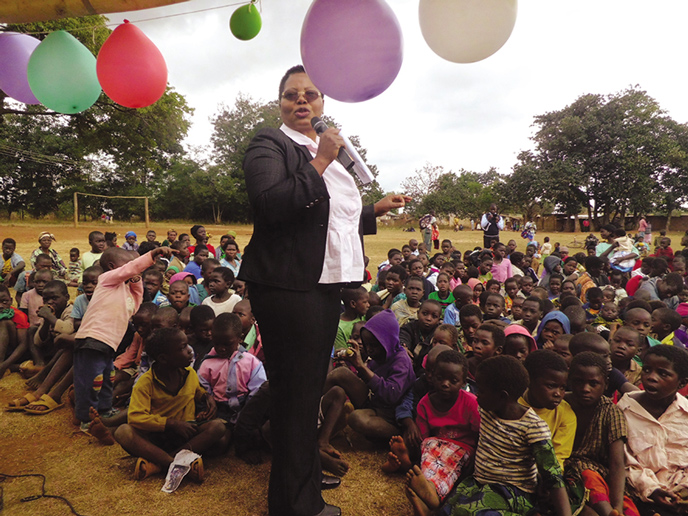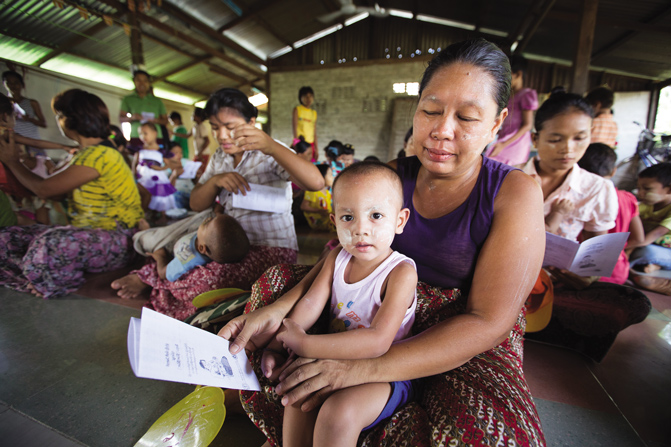Leadership, coordination and education: Essential elements for empowering women and improving nutrition
H.E. President Peter Mutharika is leading the path towards women’s empowerment in Malawi. As a champion of the UN Women “He for She” campaign, he is committed to ensuring that women and girls’ empowerment issues are prioritised in the country’s development agenda.
[vc_row row_type=”row” text_align=”left” css_animation=””][vc_column width=”1/2″]


Advocacy at the highest level: Speaking out for girls from the president’s office to the household
H.E. President Peter Mutharika is leading the path towards women’s empowerment in Malawi. As a champion of the UN Women “He for She” campaign, he is committed to ensuring that women and girls’ empowerment issues are prioritised in the country’s development agenda. President Mutharika is also highly committed to making sure that child marriage is eliminated in the country and is also a champion for higher education in Africa. Additionally, the entire cabinet, ministers and permanent secretaries of Malawi are mobilised and committed to gender equality and women’s empowerment. This high level leadership is met with equal commitment from local level traditional authorities who are working within their communities to realise the rights of every girl child.[/vc_column_text][/vc_column][/vc_row][vc_row row_type=”row” text_align=”left” css_animation=””][vc_column][vc_separator type=”transparent”][/vc_column][/vc_row][vc_row row_type=”row” text_align=”left” css_animation=””][vc_column]
Engagement with traditional leaders
Traditional authorities have been trained on all gender related laws including the Gender Equality Act and the Marriage, Divorce and Family Relations Act. Chiefs have developed their own declaration which they are capitalising on to moblise their community members and households to support the empowerment of women, end
gender based violence and child marriages, and support girls’ education. The work is on-going and traditional chiefs are making sure that these laws are being enforced at the village level through their integration within community by-laws.[/vc_column_text][/vc_column][/vc_row][vc_row row_type=”row” text_align=”left” css_animation=””][vc_column][vc_separator type=”transparent”][/vc_column][/vc_row][vc_row row_type=”row” text_align=”left” css_animation=””][vc_column]
“I have terminated 330 marriages of which 175 were girl-wives and 155 were boy-fathers, I wanted them to go to school and that has worked,” Chief Kachindamoto told Nyasa Times. “I don’t want youthful marriages, they must go to school…no child should be found loitering at home or doing household chores during
school time.”
religious leaders have been sensitised to the danger and consequences of early marriage in order to ensure that
they don’t bless child marriages. Additionally, as key community gatekeepers, they have been encouraged to act as champions of change in their communities by openly advocating for the empowerment of women.[/vc_column_text][/vc_column][/vc_row][vc_row row_type=”row” text_align=”left” css_animation=””][vc_column][vc_separator type=”transparent”][/vc_column][/vc_row][vc_row row_type=”row” text_align=”left” css_animation=””][vc_column][vc_column_text custom_options=””]Collaboration across ministries: Using data to ensure effective coverage of funded actions and impact on women and girls
Women’s empowerment is everyone’s business in Malawi. Several ministries working on education and training, health, agriculture, food security and nutrition, climate change management, governance and human rights, economic development, and gender-based violence place much emphasis on increasing women’s access to training and production resources so as to increase women’s participation in the economy.
In Malawi, the Technical Working Group on Gender Equality and Women’s Empowerment which meets every quarter brings together the Ministries of Gender, Agriculture, Finance, Health and other actors to assess progress and share plans for the next quarter. Each ministry has its own gender policy and framework as well as a gender focal point. All ministries have been trained on how they can develop budgets that are gender responsive in order to ensure that they meet the needs of both men and women. Gender budgeting is also integrated by the Ministry of Finance in its financing framework where each ministry indicates the funds allocated to gender mainstreaming work.
Ministries were also trained in gender mainstreaming to ensure that women and girls issues are part and parcel of the planning, implementation, monitoring and evaluation. The gender focal points have been pivotal in achieving this mainstreaming. They are also closely assisted by the Gender and Youth Sector working group who are active members of the Sector Working Groups.17[/vc_column_text][/vc_column][/vc_row][vc_row row_type=”row” text_align=”left” css_animation=””][vc_column][vc_separator type=”transparent”][/vc_column][/vc_row][vc_row row_type=”row” text_align=”left” css_animation=””][vc_column][vc_column_text custom_options=””]
Knowledge is Power: Keeping Girls in School
One of the government’s key strategies is to keep girls in school through initiatives that include:
- School feeding programmes
- Take-home food rations (maize, ground nuts and beans) for girls attending school at least 21 straight days per month
- Free boarding options for girl students including the provision of good sanitary and hygiene services
- Free learning materials including uniforms, books, and writing materials
- Education on human rights, gender equality and the empowerment of women to ensure that women and girls are aware of their rights
- Scholarship and bursary programmes particularly for secondary level students who are most at risk to drop out
- A social cash transfer programme that supports poor households with school fees and other school-related needs
- Community by-laws that discourage early marriages and the abuse of women and girls
The government also emphasises the need to educate the girl child at the household level on the importance
of good nutrition, food choices and preparation so they can make informed choices.
[/vc_column_text][/vc_column][/vc_row][vc_row row_type=”row” text_align=”left” css_animation=””][vc_column][vc_separator type=”transparent”][/vc_column][/vc_row][vc_row row_type=”row” text_align=”left” css_animation=””][vc_column]
“Parents should advise and educate their child on boundaries and sexual reproductive health so that they can make informed choices. It is very important to communicate with children according to their age so they understand the issues. The education must then continue at school with teachers who understand the rights of the girl child. The need to have adequate sanitation at school is also important as unfortunately girls drop out of school because of their menstruation.”
Dr. Mary Shawa, Principal Secretary for Gender, Children and Community Development of the Republic of Malawi
- Reduction in early pregnancy and teenage marriages
- Retention of girls in schools hence ensuring that they are completing school, and also performing better in their lessons
- There is an improvement in the percentages of girls that are completing secondary education and also accessing tertiary education
- Teen mothers who did return to school were often as successful in their studies as they were
before dropping out - Increased participation of women in economic life through small and medium enterprises
- Many of the women in Malawi are members of cooperatives, associations and Village Savings and Loans (VSL) groups. This has widened their opportunities for economic empowerment
- Raised awareness and change of mind-sets of parents in relation to traditional and cultural practices that marginalised girls
[/vc_column_text][/vc_column][/vc_row][vc_row row_type=”row” text_align=”left” css_animation=””][vc_column][vc_separator type=”transparent”][/vc_column][/vc_row][vc_row row_type=”row” text_align=”left” css_animation=””][vc_column]
Lessons learned and challenges
Several lessons have been learned along the way:
- Policies, legal frameworks and financing should be conducive to helping the girl child to complete her education cycle
- Government, community leaders, parents and global partners should all be on board to achieve results
- Mother-to-mother support groups can play an instrumental role in readmitting the girls who dropped out
due to teen pregnancies. - For girls already married or pregnant when starting the programs a provision for re-admission in school is essential
- The creation of scholarships helps tremendously in preventing girls from dropping out of school
 [/vc_column_text][/vc_column][vc_column width=”1/2″][vc_column_text custom_options=””]
[/vc_column_text][/vc_column][vc_column width=”1/2″][vc_column_text custom_options=””] [/vc_column_text][/vc_column][/vc_row][vc_row row_type=”row” text_align=”left” css_animation=””][vc_column][vc_separator type=”transparent”][/vc_column][/vc_row][vc_row row_type=”row” text_align=”left” css_animation=””][vc_column][vc_column_text custom_options=””]
[/vc_column_text][/vc_column][/vc_row][vc_row row_type=”row” text_align=”left” css_animation=””][vc_column][vc_separator type=”transparent”][/vc_column][/vc_row][vc_row row_type=”row” text_align=”left” css_animation=””][vc_column][vc_column_text custom_options=””]
Empowering women through nutrition sensitive social protection – The experience from Tat Lan programme
[/vc_column_text]
[vc_column_text custom_options=””]“Women are central to any strategy to improve the nutritional status of children, families, and communities. Improving
the health and nutrition of girls and women not only increases family well-being and overall development but is also essential for ensuring the health of future generations. Empowering women for nutrition involves educating, problemsolving to overcome specific barriers to improved behaviors, and helping women to develop the skills and confidence they need to make healthy choices for themselves and their families.”
Jennifer Cashin,
SUN Civil Society Alliance Coordinator
[/vc_column_text][/vc_column][/vc_row][vc_row row_type=”row” text_align=”left” css_animation=””][vc_column][vc_separator type=”transparent”][/vc_column][/vc_row][vc_row row_type=”row” text_align=”left” css_animation=””][vc_column][vc_column_text custom_options=””]The Tat Lan Programme, implemented by Save the Children, the International Rescue Committee, Oxfam, and Better Life Organization, contributes to equitably and sustainably improving the livelihoods of Cyclone Giri-affected communities in the townships of Myebon, Pauktaw, Kyaukpyu and Minbya in Rakhine State. The Tat Lan Programme is funded by the Livelihoods and Food Security Trust Fund (LIFT), a multi-donor fund established in 2009 to improve the lives and prsopects of smallholder farmers and landless people in Myanmar. Through the Tat Lan Programme a package of comprehensive, mutually-reinforcing interventions to improve livelihoods and food security in Rakhine State is implemented within community structures. The Tat Lan Programme engages with Village Development Committees (VDCs) to implement programme activities including nutrition. Village development community members are also actively engaged in the programme through advocacy. Save the Children is leading on the nutrition component of the programme which involves a cash transfer to mothers.
The Maternal and Child Cash Transfer (MCCT) pilot, which was launched in October 2014 and will finish at the end of July 2016, provides cash support of K13,000 per month for mothers for the first 1000 days of their baby’s life. The pilot covers pregnant women until their children reach 2 years of age. The soft conditions of the cash transfer are three-fold: to attend nutrition sessions and mother-to-mother support group meetings, have four antenatal check-ups, and immunisation of her child according to the Myanmar government immunisation schedule.[/vc_column_text][/vc_column][/vc_row][vc_row row_type=”row” text_align=”left” css_animation=””][vc_column][vc_separator type=”transparent”][/vc_column][/vc_row][vc_row row_type=”row” text_align=”left” css_animation=””][vc_column]
Ma Than Nu, 42, Village Development Committee member and a leader of the mother-to-mother support group
mothers have demonstrated good understanding of the value of colostrum, breast milk and good complementary feeding practices. Practicing exclusive breastfeeding still presents some challenges as mothers are still inclined to feed their babies at least some water.
In most villages, village administrators and nutrition volunteers have reported that attendance at nutrition
sessions and mother-to-mother support groups have increased, and money has incentivised mothers to seek out healthcare providers for immunisation and antenatal check-ups.
Initial findings are very positive. Mothers are indeed spending the money on food and health care. The behavior change communication is reaching women and they are now:
- Better informed on best feeding practices
- Increasingly seeking advice and support from health workers
- Attending nutrition and health education sessions more frequently
- Feeling empowered that the cash is under their control
Save the Children used the preliminary findings from the MCCT pilot to further demonstrate that nutrition-sensitive cash transfers in Myanmar are the most impactful intervention to reduce stunting, resulting in an increasing level of interest from major donors and government agencies. Save the Children and UNICEF, at the request of the Department of Social Welfare (DSW), developed and submitted a Feasibility Study and Operational Manual for the MCCT approach in 2015. DSW is using these documents to advocate for increased budget allocation for cash transfers for pregnant women and other priority groups. Save the Children also used the MCCT pilot findings, coupled with global evidence, to develop two 1,000 Day nutritionsensitive cash transfer interventions using different research designs, including a randomized control trial. Both interventions are now being funded by LIFT and will be vital for generating a robust evidence-base over the next three years on the feasibility and impact of scaling-up a 1,000 day nutrition-sensitive cash transfer national.
As part of this process, Save the Children and other development partners successfully advocated for the inclusion of a ‘flagship’ nutrition cash transfer intervention to cover the First 1,000Days in the National Social Protection Strategic Plan (NSPSP) led by the Ministry of Social Welfare, Relief and Resettlement (MSWRR), and was approved by the President’s Office.
Source: Interview with Jennifer Cashin
Public Health Nutrition Consultant – SUN Civil Society Alliance Coordinator in Myanmar
[/vc_column_text][/vc_column][/vc_row]